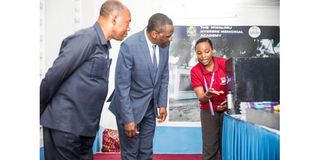Policy shift at Nyerere Academy targets commercialisation of student projects

Rector of the Mwalimu Nyerere Memorial Academy, Prof Haruna Mapesa, addresses journalists during a tour at the Dar es Salaam International Trade Fair (DITF), popularly known as Sabasaba, along Kilwa Road in Dar es Salaam on Friday, July 4, 2025. PHOTO | GADIOSA LAMTEY
What you need to know:
- The interview took place at the ongoing 49th Dar es Salaam International Trade Fair (DITF), popularly known as Sabasaba, located along the Kilwa Road in the city.
Dar es Salaam. The Mwalimu Nyerere Memorial Academy has introduced a new policy aimed at supporting the development of student innovations, helping them reach the market and generate meaningful impact.
The policy is designed to refine existing student ideas and outline strategies for investing resources to improve and advance their innovations.
The announcement was made on Thursday, July 3, 2025, by the academy’s Rector, Prof Haruni Mapesa, during an interview with The Citizen.
The interview took place at the ongoing 49th Dar es Salaam International Trade Fair (DITF), popularly known as Sabasaba, located along the Kilwa Road in the city.
Prof Mapesa said the academy currently has more than 30 innovations developed by students through their academic programmes, most of which are in the field of ICT.
He said as a result, the institution saw it necessary to establish a policy framework to further nurture and expand these ideas.
“Part of the strategy involves linking students with institutions that handle intellectual property registration, enabling them to protect and commercialise their innovations,” he said.
“This policy outlines the support process—from ideation to connecting them with potential business partners,” he added, calling on businesspeople to explore opportunities to invest in or adopt student innovations to facilitate their practical application.
Furthermore, Prof Mapesa said: “I encourage entrepreneurs to explore these brilliant student ideas. If developed and adopted, they could bring meaningful transformation to our country.”
“As an institution, we are committed to supporting our students through the innovation journey—from refining ideas to connecting them with stakeholders who can help commercialise their work. This not only contributes to individual success but also national economic growth.”
Prof Mapesa further emphasised the importance of mentorship in the innovation process.
“As academic mentors, we constantly encourage students not to give up. Not succeeding immediately doesn’t mean failure. That’s why we’re here—to guide them through the process and help them keep going,” he said.
The policy comes at a time when one of the academy’s students, Ms Glory Emmanuel, has developed a machine that uses heat and airflow to dry meat and fish, thereby enabling long-term preservation.
Ms Emmanuel, a diploma student in ICT, said she believes her invention will make life easier for many households and businesses.
“This machine removes moisture completely from meat and fish, significantly extending their shelf life. It operates on electricity, which I chose because many areas, including rural communities, now have access to power,” she explained.
She noted that the machine eliminates the need for traditional meat-drying methods, such as smoking over charcoal stoves, which contribute to deforestation.
“This innovation eliminates the need for stoves, which rely on charcoal produced by cutting down trees. It’s a more environmentally friendly method of food preservation,” she said.
According to Ms Emmanuel, the machine takes 15 minutes to preheat and 45 minutes to dry meat or fish. It is designed to operate with any electrical current and can be used in any location within its operating range.
“For those who prefer air drying, the machine is also fitted with a fan that circulates air to assist in the moisture removal process,” she added.





